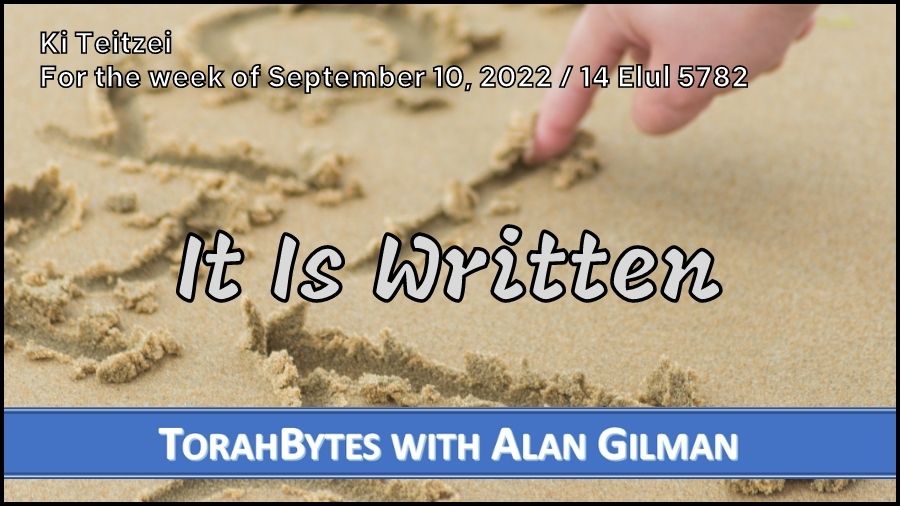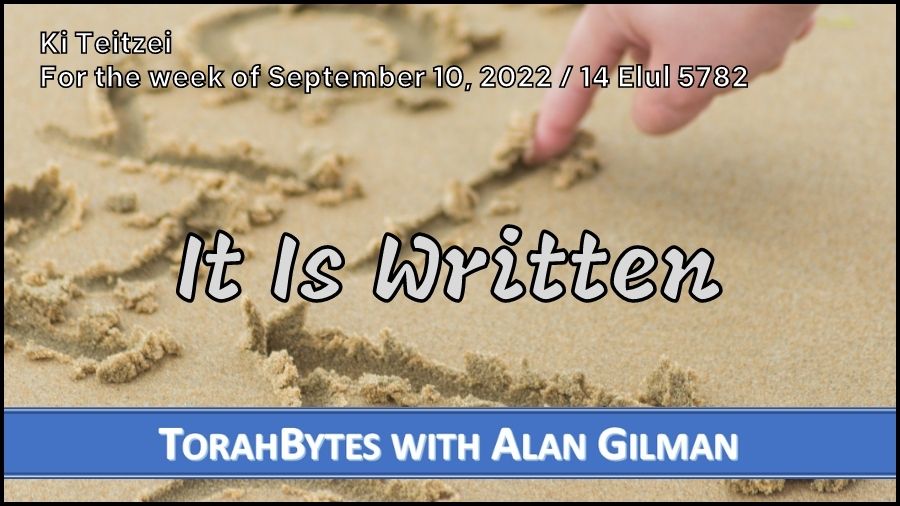
It Is Written
For the week of September 10, 2022 / 14 Elul 5782
Ki Teitzei
Torah: D’varim/Deuteronomy 21:10 – 25:19
Haftarah: Isaiah 54:1-10
Download Audio [Right click link to download]
If a man is found lying with the wife of another man, both of them shall die, the man who lay with the woman, and the woman. So you shall purge the evil from Israel. (D’varim/Deuteronomy 22:22)
Following up on The Lost Torah from last week, I want to look at how misguided interpretations of the New Covenant writings (the New Testament) have led to a tragic neglect of God’s Word as revealed through Moses. Both Yeshua and his followers have been mischaracterized as misrepresenting their deep-seated conviction of the ongoing relevancy of Hebrew Scripture.
An example of this is the well-known story of what’s often called “the woman caught in adultery” found in the eighth chapter of the Gospel of John. It is here we read of a group of religious leaders bringing a woman to Yeshua to apparently get his legal opinion. Claiming she was “caught in adultery,” they asserted that, according to the books of Moses, she should be stoned to death. The story explicitly tells us that the leaders were doing this to purposely test him to get him in trouble. If you think about it, however, this comment is hardly needed. What other reason would there be to make such an inquiry of Yeshua? Jewish courts were well established. Yeshua’s input wasn’t necessary to determine a verdict. While theoretical discussions of this nature were commonplace among Jewish leaders and teachers of the day, this wasn’t a theoretical discussion. It was an actual case.
Regardless, Yeshua takes them on, knowing full well their hypocrisy. Note his immediate reaction. He writes with his finger on the ground. How I wish I knew what he wrote, but I wouldn’t be surprised if it were a Torah verse on the subject like the one I quoted at the beginning. Yeshua then says the famous words: “Let him who is without sin among you be the first to throw a stone at her” (John 8:7) and goes back to writing. Then one by one, they leave until only Yeshua and the woman remain.
No doubt a key lesson here is one of attitude. As sinful human beings, religious leaders included, we all need to exercise great humility when addressing the wrongs of others. But many take this further, claiming Yeshua necessarily implies that such wrongs shouldn’t be addressed at all. He is wrongly understood as teaching a novel form of extreme love and forgiveness in contrast to an assumed Old Testament harsh judgementalism.
I don’t deny that in the Messiah we encounter a greater depth of love and forgiveness hitherto unknown, but it is not as entirely different as some would have us think. It’s not as if Yeshua simply lets the woman off the hook. His final words to her are not, “Neither do I condemn you,” but “Neither do I condemn you; go, and from now on sin no more.”
Exactly what the woman’s sin was, we don’t know, though in the context it is likely she had done the very thing she was accused of. Why then let her off the hook? Whether or not Yeshua wrote one or more Torah verses on the subject, he was certainly aware what Torah actually teaches on this matter: “If a man is found lying with the wife of another man, both of them shall die, the man who lay with the woman, and the woman” (D’varim/Deuteronomy 22:22). Picture the Messiah writing on the ground, “If a man is found lying with the wife of another man.” Where, then, is the man? How could it be that the woman was found caught in adultery, while the religious leaders didn’t know who the fella was? This is not about a disregard of Torah, but the exposing of gross hypocrisy.
Contrary to popular misconception, Yeshua and his followers don’t undermine Hebrew Scripture. They clarify it. Yeshua didn’t undermine, contradict, or replace Torah. Instead, he taught it as it was meant to be understood and obeyed. Once we accept that, we are far better equipped to grasp both the Hebrew Scriptures and the New Covenant Writings.
Scriptures taken from the English Standard Version
